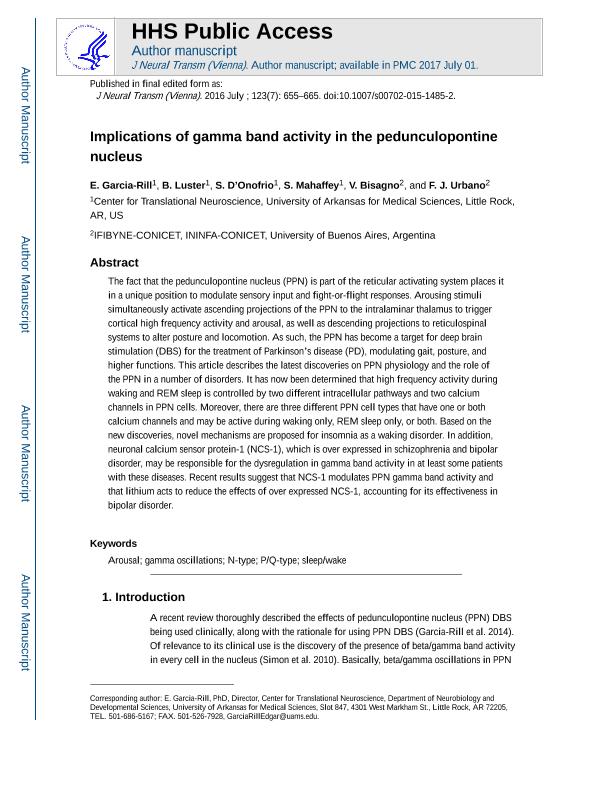Artículo
Implications of gamma band activity in the pedunculopontine nucleus
Garcia Rill, Edgar; Luster, Brennon; D'Onofrio, S.; Mahaffey, Susan; Bisagno, Veronica ; Urbano Suarez, Francisco Jose
; Urbano Suarez, Francisco Jose
 ; Urbano Suarez, Francisco Jose
; Urbano Suarez, Francisco Jose
Fecha de publicación:
07/2016
Editorial:
Springer Wien
Revista:
Journal of Neural Transmission. General Section
ISSN:
0300-9564
e-ISSN:
1435-1463
Idioma:
Inglés
Tipo de recurso:
Artículo publicado
Clasificación temática:
Resumen
The fact that the pedunculopontine nucleus (PPN) is part of the reticular activating system places it in a unique position to modulate sensory input and fight-or-flight responses. Arousing stimuli simultaneously activate ascending projections of the PPN to the intralaminar thalamus to trigger cortical high-frequency activity and arousal, as well as descending projections to reticulospinal systems to alter posture and locomotion. As such, the PPN has become a target for deep brain stimulation for the treatment of Parkinson’s disease, modulating gait, posture, and higher functions. This article describes the latest discoveries on PPN physiology and the role of the PPN in a number of disorders. It has now been determined that high-frequency activity during waking and REM sleep is controlled by two different intracellular pathways and two calcium channels in PPN cells. Moreover, there are three different PPN cell types that have one or both calcium channels and may be active during waking only, REM sleep only, or both. Based on the new discoveries, novel mechanisms are proposed for insomnia as a waking disorder. In addition, neuronal calcium sensor protein-1 (NCS-1), which is over expressed in schizophrenia and bipolar disorder, may be responsible for the dysregulation in gamma band activity in at least some patients with these diseases. Recent results suggest that NCS-1 modulates PPN gamma band activity and that lithium acts to reduce the effects of over expressed NCS-1, accounting for its effectiveness in bipolar disorder.
Palabras clave:
Arousal
,
Gamma Oscillations
,
N-Type
,
P/Q-Type
,
Sleep/Wake
Archivos asociados
Licencia
Identificadores
Colecciones
Articulos(IFIBYNE)
Articulos de INST.DE FISIOL., BIOL.MOLECULAR Y NEUROCIENCIAS
Articulos de INST.DE FISIOL., BIOL.MOLECULAR Y NEUROCIENCIAS
Articulos(ININFA)
Articulos de INST.DE INVEST.FARMACOLOGICAS (I)
Articulos de INST.DE INVEST.FARMACOLOGICAS (I)
Citación
Garcia Rill, Edgar; Luster, Brennon; D'Onofrio, S.; Mahaffey, Susan; Bisagno, Veronica; et al.; Implications of gamma band activity in the pedunculopontine nucleus; Springer Wien; Journal of Neural Transmission. General Section; 123; 7; 7-2016; 655-665
Compartir
Altmétricas



